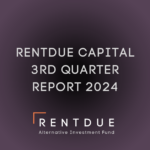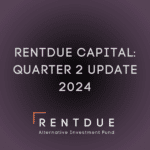At RENTDUE Capital, we believe in creating secure and profitable investment opportunities through careful planning, strategic management, and a commitment to excellence. Our flagship fund, RENTDUE Capital Fund 1, is structured as a Limited Liability Company (LLC) to provide our investors with maximum flexibility, tax efficiency, and protection.
Why We Chose an LLC
The decision to structure RENTDUE Capital Fund 1 as an LLC was made with our investors’ best interests in mind. Here’s why:
- Flexibility: The LLC structure allows us to adapt quickly to market changes, optimizing fund management to align with investor needs and market opportunities.
- Tax Efficiency: As a pass-through entity, our LLC enables you to receive your share of the fund’s income directly, simplifying your tax reporting and potentially enhancing your after-tax returns.
- Asset Protection: Your personal assets are protected, as your liability is limited to the amount you’ve invested in the fund.
Our Commitment to You
Our goal is to offer a robust investment platform that not only delivers competitive returns but also provides peace of mind. With RENTDUE Capital Fund 1, you’re investing in a fund designed to prioritize your financial security and success.
Explore our fund, understand the benefits, and join a community of like-minded investors who trust in the strategic approach and solid structure of RENTDUE Capital.
RENTDUE Registration Explained
Navigating the world of securities law can be daunting, especially for those new to the game. However, understanding how to leverage SEC Rule 506c under Regulation D can open up incredible opportunities for syndicators looking to raise capital. Rule 506c, introduced in 2012, allows businesses to raise money from accredited investors without registering the offering with the SEC—while also permitting advertising and general solicitation. This rule is a powerful tool, but like anything in the world of finance, it comes with its own set of challenges and considerations.
What is regulation D (REG D)?
Regulation D is a set of rules by the SEC that governs private securities offerings. It’s designed to protect investors from fraud while providing clear guidelines for companies that want to raise money without going through the full process of registering with the SEC. Typically, if a company wants to sell its stocks to the public, it needs to register with the SEC, but Reg D offers an exemption for certain types of private placements or accredited investor programs.
This exemption makes it easier for companies to raise capital by issuing stock without public registration, while still protecting investors. Companies that use Reg D must follow specific procedures, including filing reports with the SEC and providing detailed information about their business. These steps ensure that investors have all the necessary information to make informed decisions. Reg D also places limits on insider sales and restricts certain promotional activities, helping to maintain transparency and trust in the market.
What is Regulation D Rule 506c?
Regulation D Rule 506c is a powerful exemption that lets companies raise unlimited funds from an unlimited number of accredited investors, all while being able to advertise their offering publicly. However, to take advantage of this exemption, companies must meet specific disclosure requirements to ensure they remain eligible. You have to be an accredited investor! More below.
The Basics of Syndication and Regulation D
Syndication is all about pooling resources from multiple investors to take on larger projects than any single entity could manage alone. This collective capital approach offers significant purchasing power, enabling access to opportunities that would otherwise be out of reach. However, when dealing with securities, syndicators must be mindful of the legal landscape, which is where Regulation D comes into play.
Regulation D provides a framework that allows issuers to raise capital through private placements while staying compliant with federal securities laws. Among the rules within Reg D, Rule 506c stands out due to its allowance for general solicitation and advertising—something that was previously off-limits without registering with the SEC.
What Exactly Is SEC Rule 506c?
Rule 506c is one of the two exemptions under Rule 506 of Regulation D. It’s designed to make raising capital more accessible by permitting issuers to offer securities to an unlimited number of accredited investors. The key benefit here is that you can advertise your offerings publicly, but only accredited investors can actually invest.
To ensure compliance, issuers must verify the accredited status of their investors. This can involve checking tax returns, credit reports, and gathering other documentation. Additionally, issuers are required to provide all relevant information to potential investors to ensure informed decision-making.
While this might sound like a lot of work, the benefits of Rule 506c—such as the ability to market broadly—often outweigh the challenges. However, failing to adhere to these rules can lead to serious legal repercussions.
Understanding the Intersection of Syndication and Securities Laws
Securities laws exist to protect investors from fraud and to ensure transparency in the financial markets. The Securities Act of 1933 and the Securities Exchange Act of 1934 are two foundational laws that regulate how securities are issued and traded in the United States. These laws set the stage for how syndications must operate when dealing with securities.
The Securities Act of 1933 primarily governs the issuance of securities, requiring companies to register public offerings and provide full disclosure to potential investors. The 1934 Act regulates the secondary trading of securities, aiming to prevent insider trading and other fraudulent practices.
Regulation D, including Rule 506c, builds on these laws by offering exemptions that allow issuers to avoid the costly process of registration while still raising capital. Understanding these regulations is crucial for any syndicator looking to navigate the complexities of securities law.
Blue Sky Laws: State-Level Securities Regulations
In addition to federal regulations, issuers must also consider state securities laws, known as Blue Sky Laws. These laws vary from state to state and add another layer of compliance for syndicators. Blue Sky Laws typically require companies to register their securities offerings with state authorities, though exemptions may apply in certain cases.
For syndicators operating in multiple states, navigating Blue Sky Laws can be particularly challenging. However, Regulation D provides some relief by preempting state registration requirements for offerings that comply with Rule 506c.
Why Understanding Rule 506c Matters
For syndicators and investors alike, understanding SEC Rule 506c is essential for making informed decisions and maximizing returns. By leveraging the benefits of Rule 506c, businesses can tap into new pools of capital while staying compliant with federal and state laws. At the same time, investors can take advantage of exclusive opportunities that may not be available in public markets.
In the ever-evolving world of finance, staying informed about the tools and regulations at your disposal is key to success. Whether you’re raising capital or investing, knowing how to navigate SEC Rule 506c and the broader framework of securities laws can help you avoid pitfalls and make the most of your opportunities.

